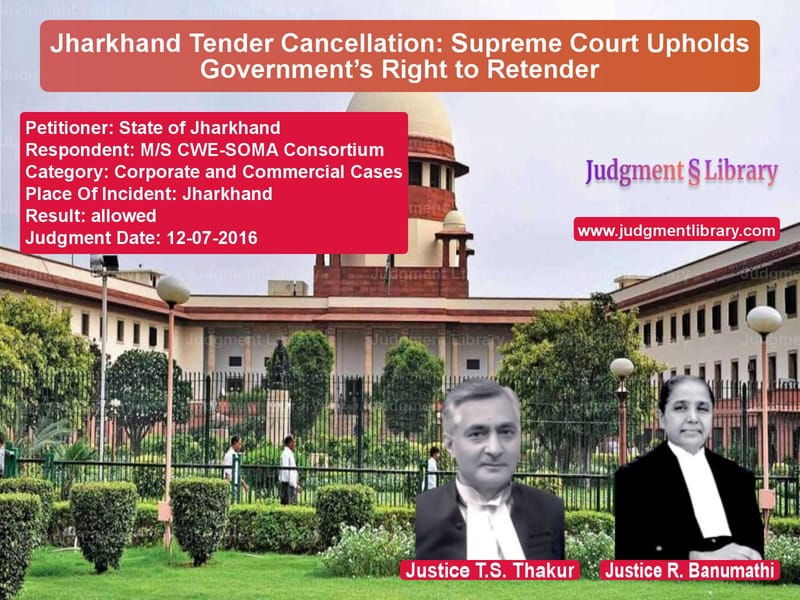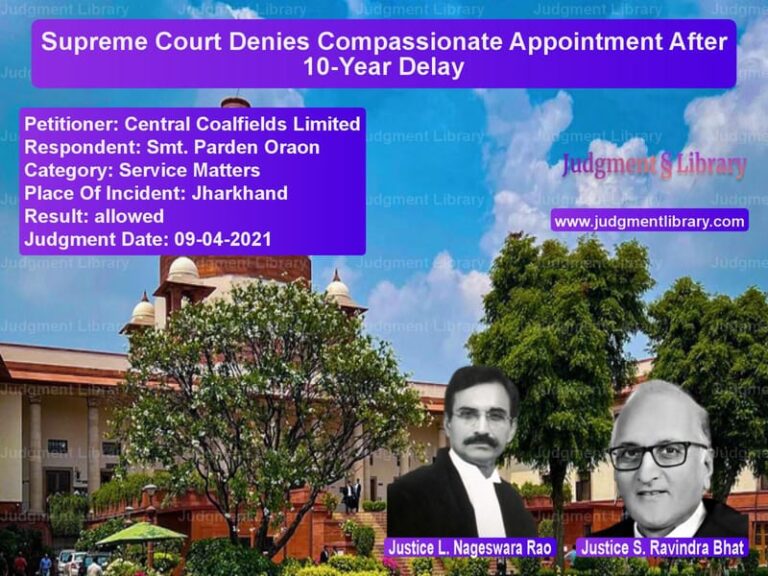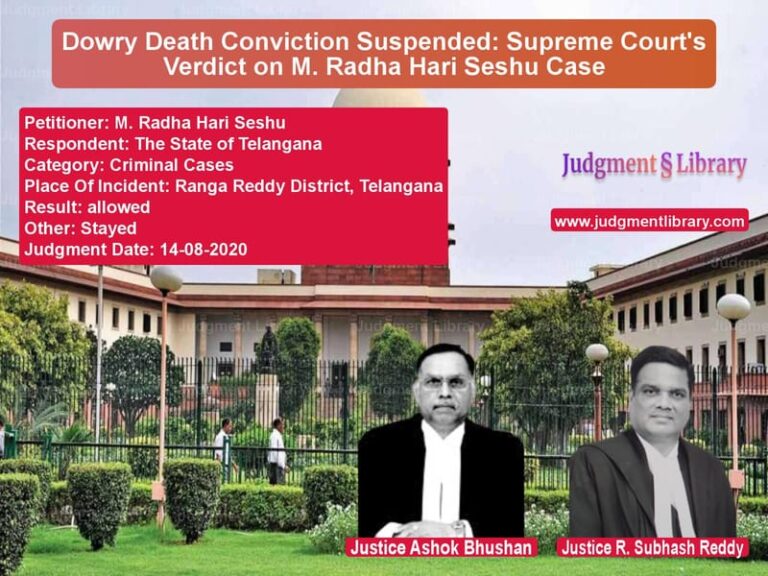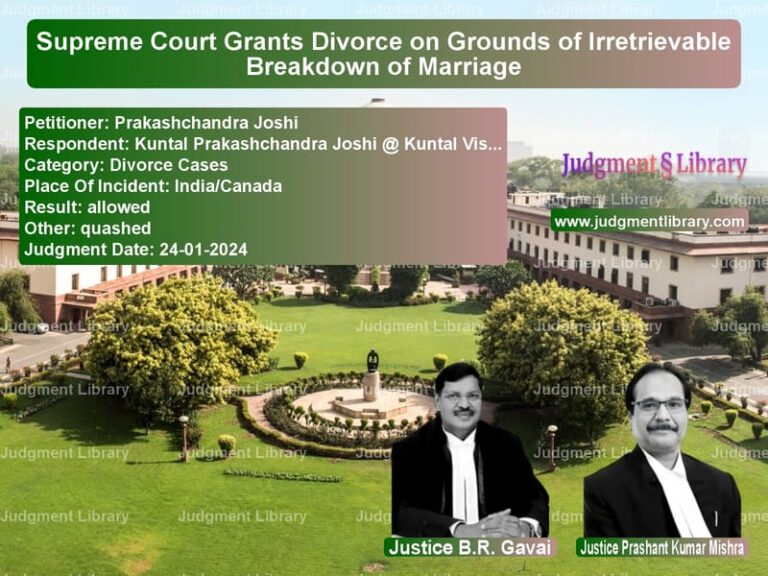Jharkhand Tender Cancellation: Supreme Court Upholds Government’s Right to Retender
The case of State of Jharkhand vs. M/S CWE-SOMA Consortium revolves around a legal dispute concerning the cancellation of a government tender for the construction of the Kharkai Dam at Icha. The Subernarekha Multipurpose Project aimed to provide irrigation, drinking water, and hydroelectric power to the states of Jharkhand, Odisha, and West Bengal. However, concerns over competition and restrictive tender conditions led the government to cancel the tender and initiate a fresh bidding process. This decision was challenged in the High Court, which ruled against the government, stating that the cancellation was unjustified. The Supreme Court, in its ruling, overturned the High Court’s decision, reaffirming the government’s right to cancel tenders when competition is inadequate.
Background of the Case
The Government of Jharkhand, through its Water Resources Department, issued a Notice Inviting Tender (NIT) for the construction of the Kharkai Dam. The project was funded under the Accelerated Irrigation Benefits Programme (AIBP) and was meant to serve multiple states. A pre-bid meeting was conducted with ten potential bidders, but only three companies—M/S CWE-SOMA Consortium, M/S IL & FS Engineering and Construction Co. Ltd., and M/S Navyuga Engineering Co. Ltd.—submitted their bids. Upon evaluation, only CWE-SOMA Consortium met the technical requirements.
Due to the lack of competition, the Tender Committee decided to cancel the tender, citing Clause 4.18(d) of the Central Vigilance Commission (CVC) Guidelines, which permits retendering when restrictive conditions limit participation. This decision was challenged by CWE-SOMA Consortium, which argued that under Clause 4.17 of the same guidelines, the bid should have been processed further despite being a single valid submission.
Legal Issues Considered
- Did the government have the right to cancel the tender?
- Was the cancellation arbitrary, or was it justified under procurement rules?
- Should the retendering process be allowed?
Arguments from Both Sides
Government’s Arguments
The State of Jharkhand defended its decision on the following grounds:
- The cancellation was consistent with Clause 4.18(d) of the CVC Guidelines, which allows retendering in cases of restrictive competition.
- Restrictive conditions in the original tender document prevented many bidders from qualifying.
- The government is not obligated to accept a tender and retains the right to cancel the bidding process before awarding the contract.
- A fresh tendering process would ensure better participation and a fairer price.
Respondent’s Arguments
CWE-SOMA Consortium countered with the following points:
- Clause 4.17 of the CVC Guidelines applied in this situation, which states that a single valid bid should still be processed.
- The cancellation was arbitrary and would result in unnecessary financial losses to the state.
- Retendering would delay the project and increase costs, thereby affecting public interest.
Supreme Court’s Judgment
The Supreme Court ruled in favor of the government, emphasizing:
- “The right to refuse the lowest or any other tender is always available to the government.”
- “The decision to cancel and re-invite tenders was based on the need for greater competition and was not arbitrary.”
- “Judicial review in government contract matters should focus on procedural fairness and not substitute administrative decisions.”
Detailed Analysis of the Judgment
The Supreme Court made several key observations in its ruling:
- It reiterated that the state has the prerogative to decide whether to award a contract, provided the decision is reasonable and not arbitrary.
- The Tender Committee had valid concerns about limited competition, and its decision to cancel the tender was justified.
- The High Court erred in presuming that there was adequate competition simply because three companies had initially participated.
- Retendering was a necessary step to ensure a fair and transparent bidding process.
The Court relied on precedents such as Rajasthan Housing Board v. G.S. Investments and Uttar Pradesh Avas Evam Vikas Parishad v. Om Prakash Sharma, which establish that no bidder has a vested right to have a contract awarded in their favor unless the bid has been formally accepted.
Implications of the Judgment
This ruling has significant implications for public procurement and government tenders:
- It reinforces the principle that governments must ensure fair competition in procurement.
- It clarifies that judicial review should not interfere with administrative discretion unless there is clear evidence of mala fide intent.
- The decision safeguards the government’s right to cancel tenders to promote transparency and fairness.
- Future tenders must be carefully drafted to avoid restrictive conditions that could limit competition.
Conclusion
The Supreme Court’s decision in this case sets an important precedent in government contract law. It underscores that while the judiciary has the power to review administrative decisions, it should not interfere unless there is clear evidence of unfairness or illegality. The ruling ensures that public funds are spent efficiently and that government tenders remain open to healthy competition.
The case serves as a reminder for both government agencies and private bidders to adhere strictly to procurement guidelines to avoid disputes. Moving forward, transparency in public bidding will remain a critical factor in ensuring the success of large-scale infrastructure projects.
Don’t miss out on the full details! Download the complete judgment in PDF format below and gain valuable insights instantly!
Download Judgment: State of Jharkhand vs MS CWE-SOMA Consort Supreme Court of India Judgment Dated 12-07-2016-1741873177237.pdf
Direct Downlaod Judgment: Direct downlaod this Judgment
See all petitions in Company Law
See all petitions in Corporate Compliance
See all petitions in Judgment by T.S. Thakur
See all petitions in Judgment by R. Banumathi
See all petitions in allowed
See all petitions in supreme court of India judgments July 2016
See all petitions in 2016 judgments
See all posts in Corporate and Commercial Cases Category
See all allowed petitions in Corporate and Commercial Cases Category
See all Dismissed petitions in Corporate and Commercial Cases Category
See all partially allowed petitions in Corporate and Commercial Cases Category







